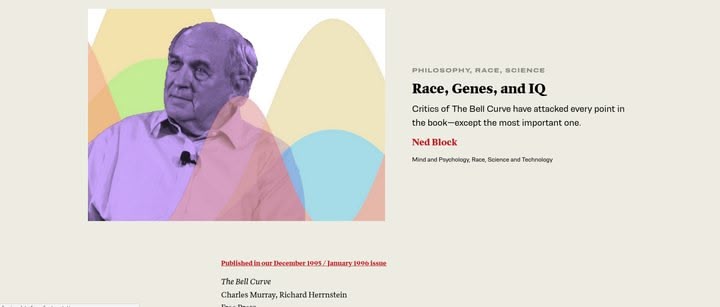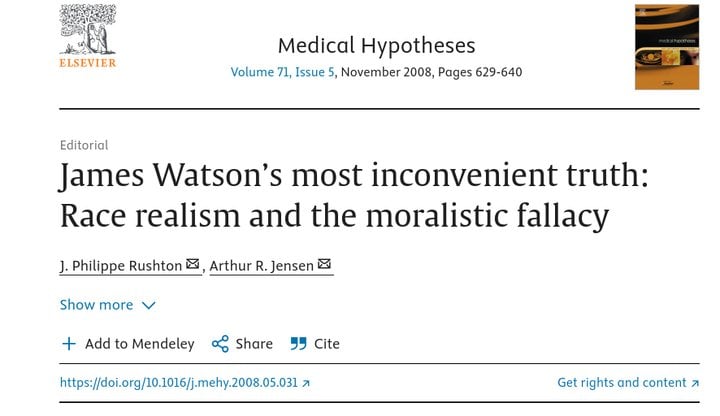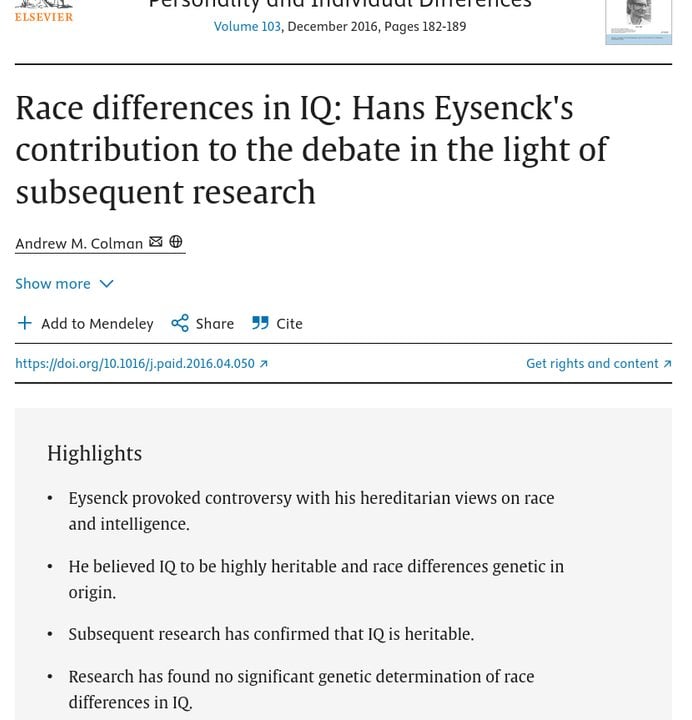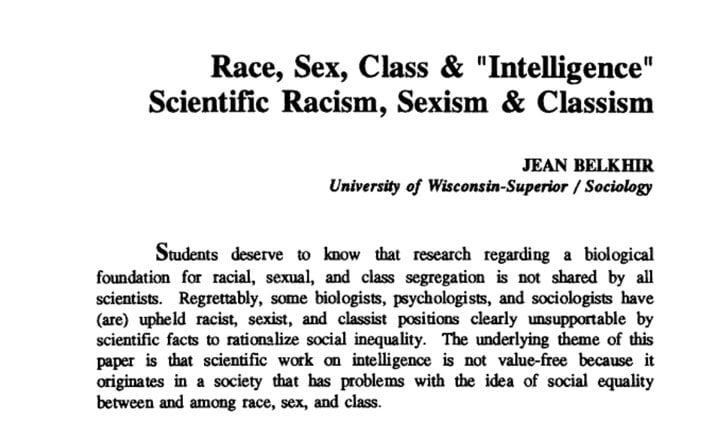Horses Crippled
The culture of the age that we live in is founded on a lie: racial egalitarianism. It is an article of faith among the elites that govern the West that the races are the same in abilities and temperament, and that it is only racial bias in the present or in the past that prevents all races from performing at the same level.
This dogma has been conventional wisdom among the Western elites since 1950, when the United Nations published its “Statement on Race,” which declared: “[T]here is no proof that the groups of mankind differ in their intelligence or temperament. The scientific evidence indicates that the range of mental capacities in all ethnic groups is the same…. [G]enetic differences are not of importance in determining the social and cultural differences between different groups of Homo sapiens.” Link, p. 102.
In the succeeding years, this dogma has filtered downwards from the elites and entrenched itself to such an extent that it is dangerous for any Westerner to contradict it.
The heart of race realism is recognizing this lie for what it is. Both the findings of the best scholars and simple common sense force us to recognize that the races are inherently different. But holding onto the truth is a hard duty, as it means refusing the dominant ideology of our culture, which constantly tries to persuade us that racial equality would be achieved if only people, and especially whites, were less racist.
The idea that the races are innately different flies in the face of the conventional wisdom that is promulgated by the mass media and many experts. It may seem odd that I am trying to persuade people to renounce the conventional wisdom. Last week, in criticizing the conspiracy theories of David Duke, I argued that conventional wisdom ought to be trusted in almost all cases. The reasonable person should reject it, I said, only where the evidence against it was overwhelming. Any challenge to conventional wisdom had to meet three stringent criteria:
There must a respected school in the relevant community of experts that thinks the conventional wisdom is wrong.
The community of experts and other shapers of opinion must have a powerful motive for not recognizing the truth.
Facts of which we can be absolutely certain contradict the conventional wisdom.
Very few challenges to conventional wisdom meet these criteria, but the challenge of race realism to racial egalitarianism does. Studies of the black-white gap in intelligence prove beyond any doubt that the race realist perspective is correct.
The school of researchers that argues for the biological basis of racial intelligence differences, among whom are psychologists Arthur Jensen, J. P. Rushton, and Richard Lynn, have solid academic credentials and publish in peer-reviewed psychological journals, and their work is respected even by those who disagree with them. Furthermore, in 1988, a survey of experts in intelligence and its measurement found that a full 53 percent believed that the black-white difference in IQ was partially genetic in origin. The same study found the news media consistently overestimated the percentage of IQ experts holding egalitarian views. There can be little doubt there still exists today at least a significant school of experts that hold race realist views.
The reason why this school exists is simply that the evidence for race realism is so powerful. Hundreds of studies have been conducted on black-white differences in IQ, and wherever blacks are in the world, they score substantially below the white mean of 100 on IQ tests. In reviewing the literature on black intelligence in Race Differences in Intelligence, Richard Lynn found that 57 studies of the IQ of blacks in Africa conducted between 1955 and 1994 consistently showed that they had a mean IQ of around 67[1]. Fourteen studies between 1986 and 2002 of blacks in the Caribbean and Latin America found a mean IQ of 71[2]. Thirty-one studies of American blacks between 1918 and 1998 found a mean IQ of 85 [3]. Twenty-nine studies conducted in Britain and the Netherlands between 1966 and 2002 found a mean black IQ of 85 there as well[4]. In Israel, two studies of Ethiopian immigrants who are Jewish by religion but racially black showed they had a mean IQ of 65 [5].
Second, despite all the efforts made in the US to achieve parity among the races, the IQ gap has not gone away. Indeed, it has remained approximately the same for nearly a century. In 1917, the first large scale IQ tests in America found about a 17-point difference between the scores of the races; the most recent studies show the difference is about the same[6]. The equalization of spending on black and white education, government educational programs for the poor, diversity training, and all the rest of it simply has had no discernible effect on the racial IQ gap.
This in itself is powerful evidence that the black-white IQ difference is rooted in biology. However, there is much more evidence of this. First, psychologists know intelligence is a highly heritable (i.e., genetically determined) trait. The heritability of IQ is as great as 80 percent, meaning it is primarily determined by genetic background [7]. The more related people are, the greater the similarity in IQ scores. The IQ’s of identical twins have a correlation of 0.86, whereas those of fraternal twins have a much weaker correlation of 0.6. However, after they have grown to be adults, there is no correlation whatsoever between the IQ’s of unrelated children who are reared in the same household[8]. Given the strong heritability of IQ, it is exceptionally unlikely that such a large difference as that between mean black and white IQ has no genetic component.
Some of the most powerful evidence of the biological origin of racial differences in intelligence comes from trans-racial adoption studies. For example, a 1992 study examining the IQ’s of adopted white and black 17-year-olds raised in upper-middle-class white families found that despite their similar environment, the adopted children with two biological white parents had a mean IQ of 106, whereas the adoptees with two black biological parents had a mean IQ of 89 [9].
There is no doubt that IQ tests do measure intelligence. In fact, a person’s IQ is the strongest predictor of how well he will perform in school and whether he will get a well-paying, high-status job [10].
In light of evidence like this, none of the cultural explanations of racial differences in intelligence and educational achievement are even remotely plausible. Some object that IQ tests are not a good measure of intelligence because they are culturally biased. But the racial IQ difference appears even on reaction-time IQ tests, in which subjects must respond as quickly as possible to a simple visual stimulus, such as a flashing light or a change in color in a dot on a screen [11]. It is difficult to see how such tests could be culturally biased.
Nor do arguments that blacks score lower on tests because of socio-economic deficits hold water. If class background explains differences in IQ scores, why do blacks raised in upper-middle-class white families score so much lower on IQ tests than whites from the same background? Moreover, black high-schoolers from affluent backgrounds regularly score lower than whites from poor households on SAT tests, which are a good measure of intelligence [12].
Do the shapers of public opinion have a motive to deny racial differences in intelligence? Very much so. In fact, they have several different reasons for denying racial difference, which will be the subject of future writings on this website. As one example, Western elites hold racist doctrines responsible for the rise of Nazism and the genocide it brought about. The elites think the key to preventing such atrocities in the future is to discredit the idea of racial differences. The Nazi genocide was very much on the minds of the writers of the UNESCO statement on race quoted earlier, which contains this passage:
The myth “race” has created an enormous amount of human and social damage. In recent years it has taken a heavy toll in human lives and caused untold suffering. It still prevents the normal development of millions of human beings and deprives civilization of the effective co-operation of productive minds. Link, p. 101.
There was thus a clear ethical and political agenda behind the UNESCO statement that gave its framers and subsequent generations of Western elites the motive to portray the evidence in a biased manner.
The work of race realist scholars proves that our culture ignores not only innate intelligence differences, but a principle of the utmost importance in explaining human behavior. If the popular media sweep such well-documented findings under the carpet, who knows what else they have swept there too? Once one has realized that innate racial differences exist, one begins to suspect a whole hidden reality beneath the surface of things that explains phenomena that are so mysterious to the talking heads on the news programs. To be a race realist is to constantly sense this monster in the depths.
ccording to The Bell Curve, Black Americans are genetically inferior to Whites. That’s not the only point in Richard Herrnstein and Charles Murray’s book. They also argue that there is something called “general intelligence” which is measured by IQ tests, socially important, and 60 percent “heritable” within Whites. (I’ll explain heritability below.) But my target here is their claim about Black genetic inferiority. It has been subject to wide-ranging criticism since the book was first published last year. Those criticisms, however, have missed its deepest flaws. Indeed, the Herrnstein/Murray argument depends on conceptual confusions about the genetic determination of human behavior that have not been fully addressed—in fact, have been tacitly accepted to some degree—by many of the book’s sharpest critics.
Before getting to the confusions, let’s first be clear about the conclusion itself. In a recent article on “The Real Bell Curve,” Charles Murray grumbles about critics, such as Stephen Jay Gould, who read the book as saying that racial differences in IQ are mostly genetic. Murray answers by quoting from the book:
If the reader is now convinced that either the genetic or environmental explanations have won out to the exclusion of the other, we have not done a sufficiently good job of presenting one side or the other. It seems highly likely to us that both genes and environment have something to do with racial differences. What might the mix be? We are resolutely agnostic on that issue; as far as we can determine, the evidence does not yet justify an estimate.
In this passage, Herrnstein and Murray are “resolutely agnostic” about whether bad environment or genetic endowment is more responsible for the lower IQs of Blacks. But they indicate no agnosticism at all about whether part of the IQ difference between Blacks and Whites is genetic; and given their way of thinking about the matter, this means that they are not at all agnostic about some Black genetic inferiority.
Before getting to the confusions, let’s first be clear about the conclusion itself. In a recent article on “The Real Bell Curve,” Charles Murray grumbles about critics, such as Stephen Jay Gould, who read the book as saying that racial differences in IQ are mostly genetic. Murray answers by quoting from the book:
If the reader is now convinced that either the genetic or environmental explanations have won out to the exclusion of the other, we have not done a sufficiently good job of presenting one side or the other. It seems highly likely to us that both genes and environment have something to do with racial differences. What might the mix be? We are resolutely agnostic on that issue; as far as we can determine, the evidence does not yet justify an estimate.
In this passage, Herrnstein and Murray are “resolutely agnostic” about whether bad environment or genetic endowment is more responsible for the lower IQs of Blacks. But they indicate no agnosticism at all about whether part of the IQ difference between Blacks and Whites is genetic; and given their way of thinking about the matter, this means that they are not at all agnostic about some Black genetic inferiority.
Recent editorials in this journal have defended the right of eminent biologist James Watson to raise the unpopular hypothesis that people of sub-Saharan African descent score lower, on average, than people of European or East Asian descent on tests of general intelligence. As those editorials imply, the scientific evidence is substantial in showing a genetic contribution to these differences. The unjustified ill treatment meted out to Watson therefore requires setting the record straight about the current state of the evidence on intelligence, race, and genetics.
In this paper, we summarize our own previous reviews based on 10 categories of evidence: The worldwide distribution of test scores; the g factor of mental ability; heritability differences; brain size differences; trans-racial adoption studies; racial admixture studies; regression-to-the-mean effects; related life-history traits; human origins research; and the poverty of predictions from culture-only explanations. The preponderance of evidence demonstrates that in intelligence, brain size, and other life-history variables, East Asians average a higher IQ and larger brain than Europeans who average a higher IQ and larger brain than Africans. Further, these group differences are 50–80% heritable. These are facts, not opinions and science must be governed by data. There is no place for the “moralistic fallacy” that reality must conform to our social, political, or ethical desires.
Introduction
When one of the greatest biologists of the 20th century, Nobel-Prize winner James Watson, noted that people of African descent average lower on intelligence tests than do Europeans and East Asians, he was excoriated by the mass media and elements of the scientific elite and forced to retire from his position as Chair of the Cold Spring Harbor Laboratory [9], [34]. Watson’s treatment was especially egregious given that, in point of scientific fact, more than a century-and-a-half of evidence corroborates his statement. Moreover, supportive new data and analyses appear regularly in mainstream, peer-reviewed journals in the relevant scientific disciplines. Evidence to the contrary is exceedingly weak. Most of the opposition to the genetic hypothesis consists of mere moralizing and worse, the creation of a threatening and coercive atmosphere incompatible with academic freedom, free enquiry, and the civil liberties of a truly democratic society. An enormous gulf separates the politically correct gatekeepers and enforcers from true experts in the behavioral sciences.
Nor is Watson’s case unique. He is but the latest in a long line of academics that have been pilloried and defamed (detailed accounts given in Hunt [20]). The others include Nobel-Prize winner William Shockley, Hans Eysenck, Linda Gottfredson, Richard Lynn, Richard Herrnstein, Charles Murray, Christopher Brand, Glayde Whitney, Helmuth Nyborg, and Tatu Vanhanen. The present writers too have endured their share of attacks. The taboo on race will surely become a major topic of investigation by sociologists of knowledge. There is no parallel to it in the history of science. It is uniquely imposed, mainly through self-censorship, by members of the Western intelligentsia in their own academy – which prides itself on a tradition of academic freedom, open inquiry, and the unfettered discovery, systematization, and pursuit of knowledge and its dissemination to the general public.
Despite the chilling effect described, we (and the others) have persevered in part because of the great importance of the topic, the fascinating data it provides, and the theoretical issues it raises [21]. One of us (JPR) traveled to South Africa to collect new IQ data from highly-selected Black students at the prestigious University of the Witwatersrand in Johannesburg. Seven studies were published based on these data yielding a median IQ of 84 (range 77–103). Assuming that African university students are 1 standard deviation (15 IQ points) above the mean of their population, as university students typically are, a median IQ of 84 is consistent with a (very low) general population mean of 70 [48].
Because many consider the race–IQ hypothesis incendiary, it is essential to thoroughly examine all the relevant data. We did this in our 60-page review, “Thirty Years of Research on Race Differences in Cognitive Ability,” which was published as the lead article in the June 2005 issue of Psychology, Public Policy, and Law, a journal of the American Psychological Association [51]. In the current article we summarize and update those findings (more complete statistical details and references can be found there). Again, the preponderance of evidence argues that it is more probable than not that the genetic contribution to racial group differences in intelligence, brain size and other life-history variables is between 50% and 80%. A good introduction to the issues involved is Bartholomew [1].
On the basis of the 10 research categories listed below, we concluded that the mean 15-point Black–White IQ difference in the US is about 80% heritable and that the 30-point African/non-African IQ difference is about 50% heritable (much of the balance being attributable to cultural and nutritional differences). The evidence demonstrates that: (1) the mean IQ around the world is 106 for East Asians, 100 for Whites, 85 for US Blacks, and 70 for sub-Saharan Africans; (2) race differences are most pronounced on the more g-loaded IQ subtests (g being the general factor of mental ability or first principal component; it picks up the “active ingredient” in intelligence tests); (3) race differences are most pronounced on the IQ subtests whose scores show the most heritability; (4) racial differences in brain size parallel the IQ differences; (5) people of mixed-race ancestry average IQ scores intermediate to their two parental populations; (6) trans-racial adoption studies show that Black, mixed-race, and East Asian children raised by White parents have IQs closer to the average of their biological parents than to the White mean; (7) people’s offspring and siblings show regression to their respective racial IQ means; (8) the races differ consistently across 60 related life-history traits; (9) the racial IQ differences agree with the latest accounts of human origins (that is, the out of Africa model); and finally (10) environmental explanations of racial IQ differences have been tested and repeatedly shown to be inadequate.
In this paper, we summarize our own previous reviews based on 10 categories of evidence: The worldwide distribution of test scores; the g factor of mental ability; heritability differences; brain size differences; trans-racial adoption studies; racial admixture studies; regression-to-the-mean effects; related life-history traits; human origins research; and the poverty of predictions from culture-only explanations. The preponderance of evidence demonstrates that in intelligence, brain size, and other life-history variables, East Asians average a higher IQ and larger brain than Europeans who average a higher IQ and larger brain than Africans. Further, these group differences are 50–80% heritable. These are facts, not opinions and science must be governed by data. There is no place for the “moralistic fallacy” that reality must conform to our social, political, or ethical desires.
Introduction
When one of the greatest biologists of the 20th century, Nobel-Prize winner James Watson, noted that people of African descent average lower on intelligence tests than do Europeans and East Asians, he was excoriated by the mass media and elements of the scientific elite and forced to retire from his position as Chair of the Cold Spring Harbor Laboratory [9], [34]. Watson’s treatment was especially egregious given that, in point of scientific fact, more than a century-and-a-half of evidence corroborates his statement. Moreover, supportive new data and analyses appear regularly in mainstream, peer-reviewed journals in the relevant scientific disciplines. Evidence to the contrary is exceedingly weak. Most of the opposition to the genetic hypothesis consists of mere moralizing and worse, the creation of a threatening and coercive atmosphere incompatible with academic freedom, free enquiry, and the civil liberties of a truly democratic society. An enormous gulf separates the politically correct gatekeepers and enforcers from true experts in the behavioral sciences.
Nor is Watson’s case unique. He is but the latest in a long line of academics that have been pilloried and defamed (detailed accounts given in Hunt [20]). The others include Nobel-Prize winner William Shockley, Hans Eysenck, Linda Gottfredson, Richard Lynn, Richard Herrnstein, Charles Murray, Christopher Brand, Glayde Whitney, Helmuth Nyborg, and Tatu Vanhanen. The present writers too have endured their share of attacks. The taboo on race will surely become a major topic of investigation by sociologists of knowledge. There is no parallel to it in the history of science. It is uniquely imposed, mainly through self-censorship, by members of the Western intelligentsia in their own academy – which prides itself on a tradition of academic freedom, open inquiry, and the unfettered discovery, systematization, and pursuit of knowledge and its dissemination to the general public.
Despite the chilling effect described, we (and the others) have persevered in part because of the great importance of the topic, the fascinating data it provides, and the theoretical issues it raises [21]. One of us (JPR) traveled to South Africa to collect new IQ data from highly-selected Black students at the prestigious University of the Witwatersrand in Johannesburg. Seven studies were published based on these data yielding a median IQ of 84 (range 77–103). Assuming that African university students are 1 standard deviation (15 IQ points) above the mean of their population, as university students typically are, a median IQ of 84 is consistent with a (very low) general population mean of 70 [48].
Because many consider the race–IQ hypothesis incendiary, it is essential to thoroughly examine all the relevant data. We did this in our 60-page review, “Thirty Years of Research on Race Differences in Cognitive Ability,” which was published as the lead article in the June 2005 issue of Psychology, Public Policy, and Law, a journal of the American Psychological Association [51]. In the current article we summarize and update those findings (more complete statistical details and references can be found there). Again, the preponderance of evidence argues that it is more probable than not that the genetic contribution to racial group differences in intelligence, brain size and other life-history variables is between 50% and 80%. A good introduction to the issues involved is Bartholomew [1].
On the basis of the 10 research categories listed below, we concluded that the mean 15-point Black–White IQ difference in the US is about 80% heritable and that the 30-point African/non-African IQ difference is about 50% heritable (much of the balance being attributable to cultural and nutritional differences). The evidence demonstrates that: (1) the mean IQ around the world is 106 for East Asians, 100 for Whites, 85 for US Blacks, and 70 for sub-Saharan Africans; (2) race differences are most pronounced on the more g-loaded IQ subtests (g being the general factor of mental ability or first principal component; it picks up the “active ingredient” in intelligence tests); (3) race differences are most pronounced on the IQ subtests whose scores show the most heritability; (4) racial differences in brain size parallel the IQ differences; (5) people of mixed-race ancestry average IQ scores intermediate to their two parental populations; (6) trans-racial adoption studies show that Black, mixed-race, and East Asian children raised by White parents have IQs closer to the average of their biological parents than to the White mean; (7) people’s offspring and siblings show regression to their respective racial IQ means; (8) the races differ consistently across 60 related life-history traits; (9) the racial IQ differences agree with the latest accounts of human origins (that is, the out of Africa model); and finally (10) environmental explanations of racial IQ differences have been tested and repeatedly shown to be inadequate.
...











